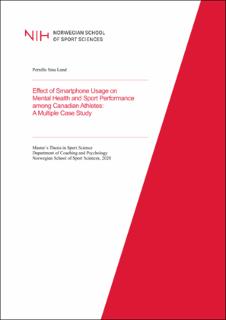| dc.description.abstract | The purpose of this multiple case study was to investigate smartphone usage in a sample of Canadian athletes. More precisely, the study had three objectives, namely to examine (a) experiences and features of smartphone usage, (b) the perceived impact of smartphone usage on mental health and performance in sport and (c) the relation between real-time and self-perceived smartphone usage estimates.
Data were collected over nine months via focus groups, in-depth interviews, surveys and objective tracking of smartphone usage through a novel mobile application. These data were then investigated through document and content analysis and mapped out as narratives to represent athletes’ voices.
The main findings showed that athletes have multifaceted and nuanced experiences with their smartphones. Social media applications (e.g., Instagram, Snapchat, and Facebook) accounted for a staggering amount of the participants’ total smartphone usage over the assessed nine-month period. Most athletes had two or more social media-related apps in their top three most frequently used apps. The findings revealed that the prevalence of overnight smartphone usage from 12 am to 6 am compromised up to twenty percent of total active screen time.
The results supported the hypothesis that smartphone usage in and around the sport context elicited both beneficial and detrimental consequences. Data analysis suggested that social media usage was associated with more harmful than helpful effects on mental health and performance than other smartphone features and applications that the athletes utilized. The findings allude to associated changes in self-regulation capacity. Finally, the findings revealed a gap between real-time and self-perceived smartphone usage, The overall findings provide the fundamentals for the development of guiding principles for smartphone usage for athletes and sports programs, and suggest areas of future research. It is, however, premature to propose universal guidelines for the use of smartphone and social media within the athletic community. Continued research is required to facilitate optimal performance outcomes and overall mental health of athletes within our device–driven society. | en_US |
